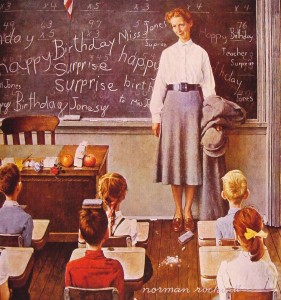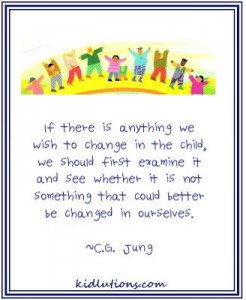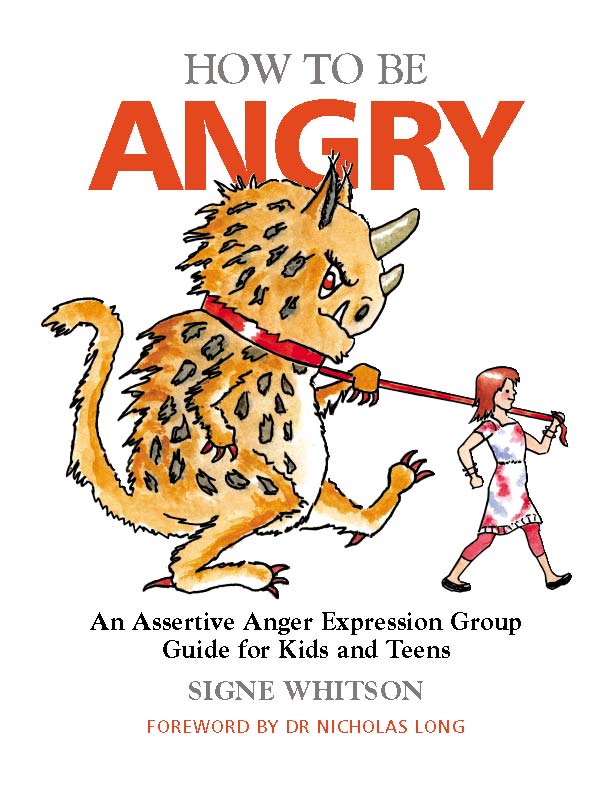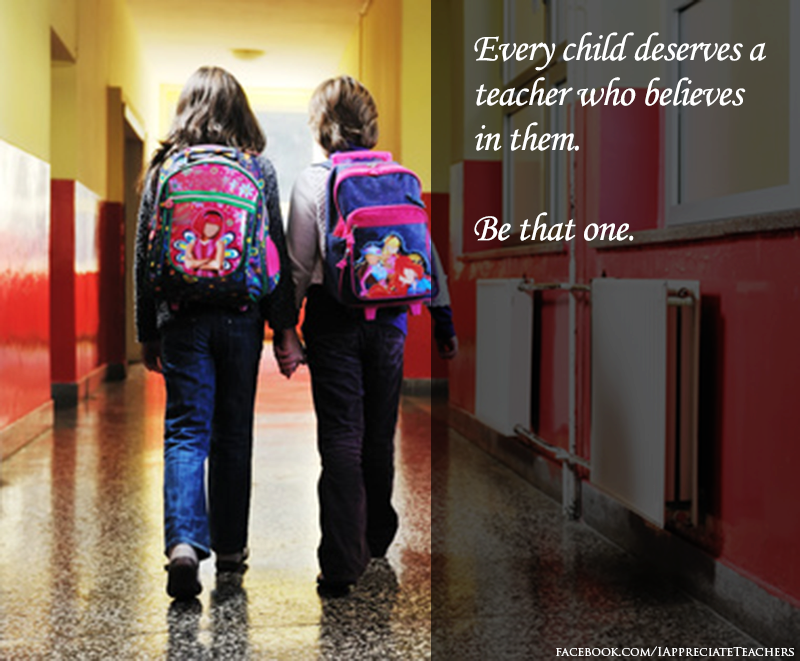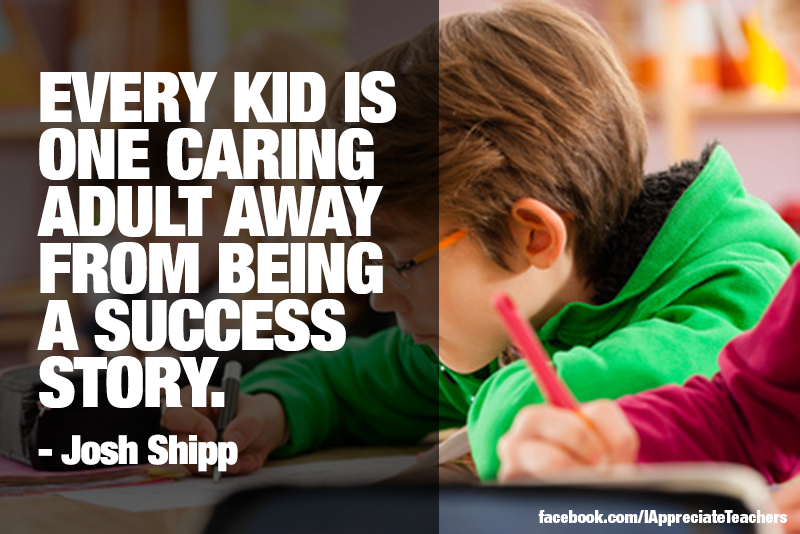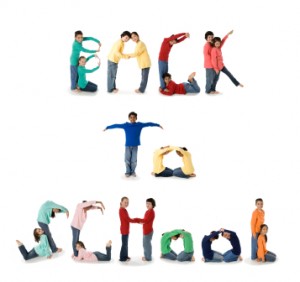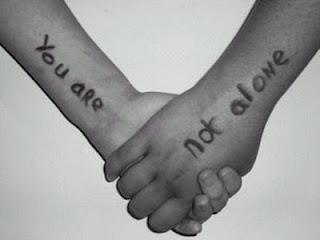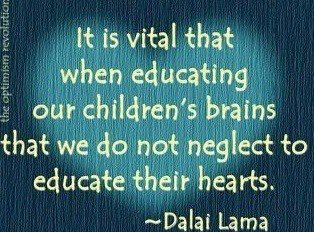Archive for August, 2013
Making a Difference in the Life of a Child
0I found this story on the internet one day, about 9 months ago, and posted it to the Life Space Crisis Intervention Institute’s Facebook page. It has been our most popular post ever, striking a chord with so many adults who have known children who needed “a special someone.” Here it is for you to read, relate, enjoy, and share:
As she stood in front of her 5th grade class on the very first day of school, she told the children an untruth. Like most teachers, she looked at her students and said that she loved them all the same. However, that was impossible, because there in the front row, slumped in his seat, was a little boy named Teddy Stoddard.
Mrs. Thompson had watched Teddy the year before and noticed that he did not play well with the other children, that his clothes were messy and that he constantly needed a bath. In addition, Teddy could be unpleasant.
It got to the point where Mrs. Thompson would actually take delight in marking his papers with a broad red pen, making bold X’s and then putting a big “F” at the top of his papers.
At the school where Mrs. Thompson taught, she was required to review each child’s past records and she put Teddy’s off until last. However, when she reviewed his file, she was in for a surprise.
Teddy’s first grade teacher wrote, “Teddy is a bright child with a ready laugh. He does his work neatly and has good manners… he is a joy to be around..”
His second grade teacher wrote, “Teddy is an excellent student, well liked by his classmates, but he is troubled because his mother has a terminal illness and life at home must be a struggle.”
His third grade teacher wrote, “His mother’s death has been hard on him. He tries to do his best, but his father doesn’t show much interest and his home life will soon affect him if some steps aren’t taken.”
Teddy’s fourth grade teacher wrote, “Teddy is withdrawn and doesn’t show much interest in school. He doesn’t have many friends and he sometimes sleeps in class.”
By now, Mrs. Thompson realized the problem and she was ashamed of herself. She felt even worse when her students brought her Christmas presents, wrapped in beautiful ribbons and bright paper, except for Teddy’s. His present was clumsily wrapped in the heavy, brown paper That he got from a grocery bag Mrs. Thompson took pains to open it in the middle of the other presents. Some of the children started to laugh when she found a rhinestone bracelet with some of the stones missing, and a bottle that was one-quarter full of perfume.. But she stifled the children’s laughter when she exclaimed how pretty the bracelet was, putting it on, and dabbing some of the perfume on her wrist. Teddy Stoddard stayed after school that day just long enough to say, “Mrs. Thompson, today you smelled just like my Mom used to.” After the children left, she cried for at least an hour.
On that very day, she quit teaching reading, writing and arithmetic. Instead, she began to teach children. Mrs. Thompson paid particular attention to Teddy. As she worked with him, his mind seemed to come alive. The more she encouraged him, the faster he responded. By the end of the year, Teddy had become one of the smartest children in the class and, despite her lie that she would love all the children the same, Teddy became one of her “teacher’s pets..”
A year later, she found a note under her door, from Teddy, telling* her that she was still the best teacher he ever had in his whole life.
Six years went by before she got another note from Teddy. He then wrote that he had finished high school, third in his class, and she was still the best teacher he ever had in life.
Four years after that, she got another letter, saying that while things had been tough at times, he’d stayed in school, had stuck with it, and would soon graduate from college with the highest of honors. He assured Mrs. Thompson that she was still the best and favorite teacher he had ever had in his whole life.
Then four more years passed and yet another letter came. This time he explained that after he got his bachelor’s degree, he decided to go a little further. The letter explained that she was still the best and favorite teacher he ever had. But now his name was a little longer…. The letter was signed, Theodore F. Stoddard, MD.
The story does not end there. You see, there was yet another letter that spring. Teddy said he had met this girl and was going to be married. He explained that his father had died a couple of years ago and he was wondering if Mrs. Thompson might agree to sit at the wedding in the place that was usually reserved for the mother of the groom.
Of course, Mrs. Thompson did. And guess what? She wore that bracelet, the one with several rhinestones missing. Moreover, she made sure she was wearing the perfume that Teddy remembered his mother wearing on their last Christmas together.
They hugged each other, and Dr. Stoddard whispered in Mrs. Thompson’s ear, “Thank you Mrs. Thompson for* believing in me. Thank you so much for making me feel important and showing me that I could make a difference.”
Mrs. Thompson, with tears in her eyes, whispered back. She said, “Teddy, you have it all wrong. You were the one who taught me that I could make a difference. I didn’t know how to teach until I met you.”
The Angry Smile Online Training Teaches People How to Manage Passive Aggressive Behavior
0The Angry Smile ONLINE course is NOW AVAILABLE via the Life Space Crisis Intervention Institute’s website! See below for a very special offer…
Is there a person in your life who procrastinates, carries out tasks in intentionally inefficient ways, is quietly manipulative, creates minor but chronic irritation in others, and makes you feel like you are on an emotional roller coaster? If so, you may be working or living with a PASSIVE AGGRESSIVE person.
REGISTER TODAY FOR THE ANGRY SMILE ONLINE TRAINING to discover how to stop frustrating arguments, endless conflict cycles, and relationship-damaging wars of words.
10% DISCOUNT: All participants who register for The Angry Smile Online course during the month of August 2013 will receive a 10% discount on the course fee! Simply enter the code FACEBOOK at checkout and the discount will be applied upon checkout.
